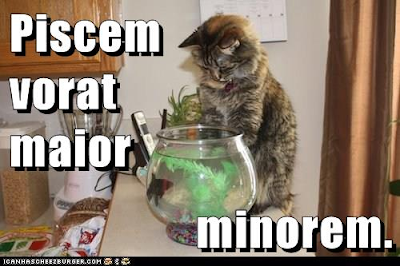But there's something different about the 3rd declension. Do you remember from when you studied the genitive ending for the 3rd declension? Here's that previous post if you want to review. The trick with the 3rd declension is that you cannot form the stem from the nominative form, like you can for the 1st and 2nd declension. For the 3rd declension, you need to know the stem. So, to make the genitive you add -is to the stem, and you make the accusative by adding -em to the stem. And how do you know the stem? You have to learn it, or you can look it up in the dictionary. The dictionary always gives the genitive form because that is what you need to know the stem:
mors. nominativemort-is genitivestem: mort- (remove -is from the genitive to get the stem)mort-em accusative
If you want to take a look at the variety of 3rd-declension noun and adjective stems, this slideshow gives you the genitive form next to the nominative form for 50 different 3rd-declension words. You can click on through and compare the nominative and genitive forms to get a sense of how these stems work:
And here is a little slideshow (with cats) of the words you have seen before:
And here are today's proverbs; I've underlined the 3rd-declension accusatives:
1. Occasio facit furem.
Opportunity makes (the) thief.
oc-CA-sio facit furem.
The 3rd-declension noun occasio, "opportunity, occasion" gives us English "occasion."
1. Occasio facit furem.
Opportunity makes (the) thief.
oc-CA-sio facit furem.
The 3rd-declension noun occasio, "opportunity, occasion" gives us English "occasion."
The word furem is the accusative of fur, "thief." You haven't seen this noun before, but you have seen the relative adjectives furtivus and furtiva.
This saying has been adopted in English: "Opportunity makes the thief."
2. Tempus neminem manet.
Time waits-for nobody.
tempus NE-minem manet.
You already know all the words in this saying!
2. Tempus neminem manet.
Time waits-for nobody.
tempus NE-minem manet.
You already know all the words in this saying!
The word neminem is the accusative form of nemo, a 3rd-declension noun you know already.
Compare the English saying, "Time and tide wait for no man."
3. Nescit homo finem suum.
(A) person doesn't-know their end.
nescit homo finem suum.
You also know all the words in this saying!
3. Nescit homo finem suum.
(A) person doesn't-know their end.
nescit homo finem suum.
You also know all the words in this saying!
The word finem is the accusative form of finis, a 3rd-declension noun you know already. It is a masculine noun, so it takes a masculine accusative adjective: suum.
The "end" here refers to the end of life. In other words, no one can know what life has in store for them in the future, especially at the end. The words come from the Biblical Book of Ecclesiastes.
4. Avis matutina vermem capit.
(The) early-morning bird gets (the) worm.
avis matu-TI-na vermem capit.
The 3rd-declension noun avis is a feminine noun, so it takes a feminine adjective: matutina, "morning, early-morning, early." The Roman goddess of the dawn was Matuta, also known as Mater Matuta, equivalent to Greek Aurora. You can find out more at Wikipedia.
4. Avis matutina vermem capit.
(The) early-morning bird gets (the) worm.
avis matu-TI-na vermem capit.
The 3rd-declension noun avis is a feminine noun, so it takes a feminine adjective: matutina, "morning, early-morning, early." The Roman goddess of the dawn was Matuta, also known as Mater Matuta, equivalent to Greek Aurora. You can find out more at Wikipedia.
The word vermem is the accusative form of vermis, "worm," a 3rd-declension noun. You can see this Latin root in English "vermin." Both Latin vermis and English "worm" are from the Indo-European root wr̥mis.
The verb capit means "takes, grabs, gets," and you can see this root in English "capture."
We have this saying in English too: "The early bird gets the worm."
5. Piscem vorat maior minorem.
(The) bigger (fish) eats (the) littler fish.
Piscem vorat maior mi-NO-rem.
The word piscem is the accusative form of piscis, "fish," a 3rd-declension noun. You can see this Latin word in the astrological sign "Pisces" (pisces is the plural form in Latin: "fishes").
We have this saying in English too: "The early bird gets the worm."
5. Piscem vorat maior minorem.
(The) bigger (fish) eats (the) littler fish.
Piscem vorat maior mi-NO-rem.
The word piscem is the accusative form of piscis, "fish," a 3rd-declension noun. You can see this Latin word in the astrological sign "Pisces" (pisces is the plural form in Latin: "fishes").
The masculine adjective maior, "bigger," gives us English "major." This is the comparative form of an adjective you have seen before: magnus.
The word minorem is the accusative form of an adjective you've seen before, minor.
The word minorem is the accusative form of an adjective you've seen before, minor.
Notice how the accusative noun phrase, piscem minorem, wraps around the whole sentence.
I can't resist sharing Brueghel's illustration of this saying, which has a line of Latin verse below the image: Grandibus exigui sunt pisces piscibus esca, "The tiny fishes are food for the big fishes."
- Occasio facit furem.
- Tempus neminem manet.
- Nescit homo finem suum.
- Avis matutina vermem capit.
- Piscem vorat maior minorem.
Plus the LOLCats!






No comments:
Post a Comment
Comments are limited to Google accounts. You can also email me at laurakgibbs@gmail.com